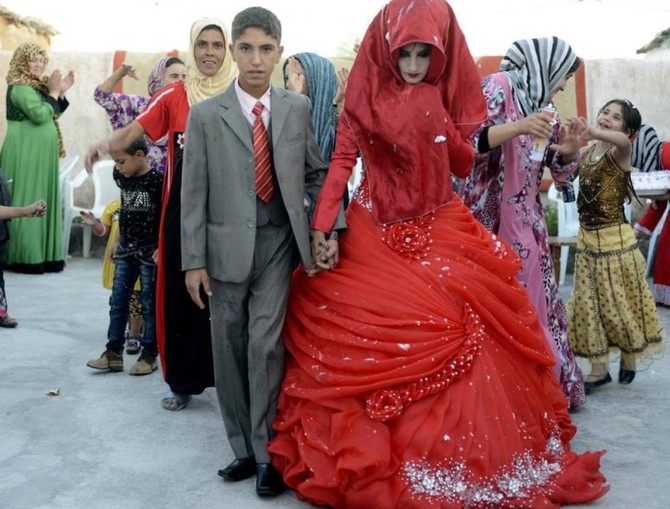BAGDHAD: A proposal in Iraq’s parliament to scrap the minimum age for Muslim girls to marry has stirred outrage among critics who view it as a license “to rape children.”
Conservative Shiite deputies on October 31 proposed an amendment to a 1959 law that set the minimum age for marriage at 18.
The initial legislation, passed shortly after the fall of the Iraqi monarchy, transferred the right to decide on family affairs from religious authorities to the state and its judiciary.
But now the new bill looks to go back on that — and would authorize the marriage of any girl if it had the consent of the religious leaders from the Shiite or Sunni Muslim community to which her parents belong.
In effect, it makes “the opinion of the Shiite and Sunni ulema (scholars) obligatory for judges,” said a liberal independent MP, Faiq Al-Sheikh, a member of Iraq’s legal commission.
Historically, he recalled, Islam has allowed the marriage of pubescent girls from the age of nine, the same as Aisha when she is believed to have been married to the Prophet Muhammad.
Social media has been flooded with criticism of the parliamentary bill, ranging from outright indignation to black humor, with anger also rife on the streets.
“It’s a law worthy of the Islamic State (jihadist group) that provides legal cover to the rape of children,” Hadi Abbas, an army retiree in the southern city of Kut, said.
Ali Lefta, a 40-year-old teacher in the port city of Basra, said it amounted to “the murder of the innocence of children” and that the bill was “the latest in a string of stupid laws based on tribal and confessional modes of thinking.”
In defense of the bill sponsored by his party, Ammar Toama, who heads the Shiite parliamentary group Fadila, said it “makes no mention of age and stipulates only that she (bride) must be pubescent, capable of deciding, and have the accord of her tutor and a judge.”
Under the Iraqi constitution, citizens have to declare their religious affiliation on certain issues. Marriage and inheritance terms for Shiites differ from those for Sunnis.
Toama said the bill’s aim was to bring the law “in line with the beliefs” of practicing Muslims.
But foreign missions in Baghdad and the United Nations have been up in arms, warning against institutionalized discrimination against women and girls.
Many Iraqis like Safia Mohssen, a mother of three girls, also remain opposed and have taken to mocking the priorities of parliamentarians.
“We have war, crises, unemployment, and yet our parliament is busy with laws that violate children’s rights!” she fumed. “The Islamists want to take us back to the Middle Ages.”
Majeda Al-Tamimi, a woman legislator, said she was confident that many of her colleagues in parliament would oppose the bill.
But whether it passes or not, women like Umm Mohammed in the conservative rural province of Zi Qar, who wed at the age of 14, said marriage was a family affair.
“Only families know when their daughter has reached puberty and at what age she can marry,” said the 65-year-old Iraqi.
‘Child marriage’ bill stirs outrage in Iraq
‘Child marriage’ bill stirs outrage in Iraq

Sudan’s RSF says seizes back control of key Darfur base from army allies

- Dozens of RSF soldiers were killed, vehicles destroyed and supplies captured as they captured the base, they said
DUBAI/CAIRO: Sudan’s Rapid Support Forces (RSF) seized back control of a key logistical base in North Darfur on Sunday, the paramilitary group said, a day after it was taken by rival forces allied with Sudan’s army.
The conflict between the RSF and the army erupted in April 2023, and some of the fiercest fighting has taken place in North Darfur as the army and allied Joint Forces — a collection of former rebel groups — battle to maintain a last foothold in the wider Darfur region.
The Joint Forces and the army said in statements they had taken control on Saturday of the Al-Zurug base, which the RSF has used during the 20-month war as a logistical base to channel supplies from over the nearby borders with Chad and Libya.
Dozens of RSF soldiers were killed, vehicles destroyed and supplies captured as they captured the base, they said.
The incident could inflame ethnic tensions between the Arab tribes that form the base of the RSF and the Zaghawa tribe that forms most of the Joint Forces, analysts say.
The RSF accused Joint Forces fighters of killing civilians and burning down nearby homes and public amenities during the raid.
“The Joint Forces carried out ethnic cleansing against innocent civilians in Al-Zurug and intentionally killed children, women, and the elderly and burnt and destroyed wells and markets and homes and the health center and schools,” it said in a statement on Sunday.
The Joint Forces said the base had been used by the RSF as a “launching point for barbaric operations against civilians” in areas including Al-Fashir, the capital of North Darfur state and one of the most active frontlines in the fighting.
Since fighting picked up in Al-Fashir in mid-April, at least 782 civilians have been killed, according to a UN human rights report, the result of attacks via “intense” heavy artillery and suicide drones from the RSF and airstrikes and artillery strikes by the army.
On Sunday, activists from the Al-Fashir Resistance Committee reported an onslaught of at least 30 missiles fired on different parts of the city.
Seizing control of the city would bolster the RSF’s attempt to install a parallel government to the national government in Port Sudan, analysts say.
Jordanian minister criticizes ‘sensational’ reporting of Middle East events

- Mohammad Momani stressed the importance of obtaining verified information
- He said media freedom should not be misused to distort regional events
LONDON: Jordanian Minister of Government Communication Mohammad Momani emphasized the importance of professionalism and accuracy in reporting Middle Eastern events during a meeting with local, Arab and international media representatives on Sunday.
Momani said that a few international media outlets “sensationalize” regional events at the cost of accuracy, arguing that “this does not serve the public and undermines professional standards.”
He discussed with media representatives the importance of obtaining verified information to ensure accuracy, serve public opinion and uphold the right to knowledge, the official Jordanian news agency, Petra, reported.
Over the past year, some Western media outlets reporting on the Israeli war in the Gaza Strip and the conflict with Lebanon, as well as the fall of the Assad regime in Syria, have investigated some details in the stories they ran.
CNN investigated a recent video report that captures the moment a Syrian prisoner was freed from a secretive prison in Damascus. Critics have claimed that the report was staged and that the man featured in the CNN video was not who he claimed to be.
Momani said that media freedom should not be misused to distort regional circumstances or promote political and ideological agendas, Petra added.
He called on media outlets in Jordan to report on the country’s political and security realities professionally, accurately representing the event in all its aspects while rejecting false or misleading narratives.
Momani said that the Jordanian government was dedicated to transparency and communication with media representatives, including Arab, international and local outlets.
He praised the professional reporting on regional events by Jordanian state agencies and commended the country’s balanced political stance and commitment to stability.
Jordan’s Ministry of Government Communication regularly holds meetings and briefings to enhance communication with media representatives in Jordan.
Weakened Iran could pursue nuclear weapon, White House’s Sullivan says

WASHINGTON: The Biden administration is concerned that a weakened Iran could build a nuclear weapon, White House National Security Adviser Jake Sullivan said on Sunday, adding that he was briefing President-elect Donald Trump’s team on the risk.
Iran has suffered setbacks to its regional influence after Israel’s assaults on its allies, Palestinian Hamas and Lebanon’s Hezbollah, followed by the fall of Iran-aligned Syrian President Bashar Assad.
Israeli strikes on Iranian facilities, including missile factories and air defenses, have reduced Tehran’s conventional military capabilities, Sullivan told CNN.
“It’s no wonder there are voices (in Iran) saying, ‘Hey, maybe we need to go for a nuclear weapon right now ... Maybe we have to revisit our nuclear doctrine’,” Sullivan said.
Iran says its nuclear program is peaceful, but it has expanded uranium enrichment since Trump, in his 2017-2021 presidential term, pulled out of a deal between Tehran and world powers that put restrictions on Iran’s nuclear activity in exchange for sanctions relief.
Sullivan said that there was a risk that Iran might abandon its promise not to build nuclear weapons.
“It’s a risk we are trying to be vigilant about now. It’s a risk that I’m personally briefing the incoming team on,” Sullivan said, adding that he had also consulted with US ally Israel.
Trump, who takes office on Jan. 20, could return to his hard-line Iran policy by stepping up sanctions on Iran’s oil industry. Sullivan said Trump would have an opportunity to pursue diplomacy with Tehran, given Iran’s “weakened state.”
“Maybe he can come around this time, with the situation Iran finds itself in, and actually deliver a nuclear deal that curbs Iran’s nuclear ambitions for the long term,” he said.
Netanyahu says Israel will continue to act against the Houthis

- On Thursday, Israeli jets launched a series of strikes against energy and port infrastructure in Yemen
- Response to hundreds of missile and drone attacks launched by Houthis since start of Gaza war
JERUSALEM: Israeli Prime Minister Benjamin Netanyahu said on Sunday Israel would continue acting against the Iran-backed Houthis in Yemen, whom he accused of threatening world shipping and the international order, and called on Israelis to be steadfast.
“Just as we acted forcefully against the terrorist arms of Iran’s axis of evil, so we will act against the Houthis,” he said in a video statement a day after a missile fired from Yemen fell in the Tel Aviv area, causing a number of mild injuries.
On Thursday, Israeli jets launched a series of strikes against energy and port infrastructure in Yemen in a move officials said was a response to hundreds of missile and drone attacks launched by the Houthis since the start of the Gaza war 14 months ago.
On Saturday, the US military said it conducted precision airstrikes against a missile storage facility and a command-and-control facility operated by Houthis in Yemen’s capital, Sanaa.
Netanyahu, strengthened at home by the Israeli military’s campaign against Iran-backed Hezbollah forces in southern Lebanon and by its destruction of most of the Syrian army’s strategic weapons, said Israel would act with the United States.
“Therefore, we will act with strength, determination and sophistication. I tell you that even if it takes time, the result will be the same,” he said.
The Houthis have launched repeated attacks on international shipping in waters near Yemen since November 2023, in support of the Palestinians over Israel’s war with Hamas.
Iraq PM says Mosul airport to open in June, 11 years after Daesh capture

- On June 10, 2014, the Daesh group seized Mosul
BAGHDAD: Iraqi Prime Minister Mohammed Shia Al-Sudani on Sunday ordered for the inauguration of the airport in second city Mosul to be held in June, marking 11 years since Islamists took over the city.
On June 10, 2014, the Daesh group seized Mosul, declaring its “caliphate” from there 19 days later after capturing large swathes of Iraq and neighboring Syria.
After years of fierce battles, Iraqi forces backed by a US-led international coalition dislodged the group from Mosul in July 2017, before declaring its defeat across the country at the end of that year.
In a Sunday statement, Sudani’s office said the premier directed during a visit there “for the airport’s opening to be on June 10, coinciding with the anniversary of Mosul’s occupation, as a message of defiance in the face of terrorism.”
Over 80 percent of the airport’s runway and terminals have been completed, according to the statement.
Mosul’s airport had been completely destroyed in the fighting.
In August 2022, then-prime minister Mustafa Al-Kadhimi laid the foundation stone for the airport’s reconstruction.
Sudani’s office also announced on Sunday the launch of a project to rehabilitate the western bank of the Tigris in Mosul, affirming that “Iraq is secure and stable and on the right path.”





















